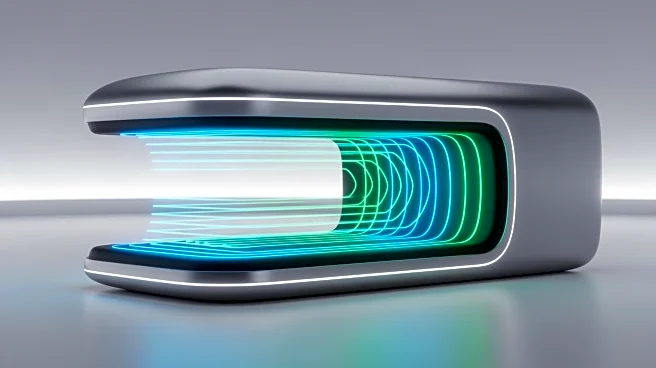What's Happening?
GE HealthCare has submitted a 510(k) application to the U.S. Food and Drug Administration (FDA) for its Photonova Spectra, a new photon-counting computed tomography (PCCT) system. This system is built on proprietary Deep Silicon detector technology and is designed
to deliver ultra-high-definition imaging, enhanced material separation, and rapid acquisition speeds. Unlike conventional CT systems that convert X-rays into light, the Photonova Spectra directly counts individual X-ray photons and measures their energy, potentially offering higher spectral and spatial resolution and improved tissue characterization. The system aims to redefine diagnostic confidence and support advanced lesion characterization and treatment monitoring. Peter Arduini, President & CEO of GE HealthCare, emphasized the system's potential to redefine decision-making and care delivery.
Why It's Important?
The submission of Photonova Spectra for FDA clearance represents a significant advancement in medical imaging technology. By utilizing Deep Silicon detector technology, the system promises to enhance diagnostic accuracy and efficiency, which is crucial in addressing rising patient volumes and diagnostic complexity. The ability to harness up to 50 times more data than conventional CT systems could lead to improved clinical decision-making and smoother workflows. This innovation is particularly important for specialties that rely heavily on precise imaging, such as oncology and cardiology, potentially improving patient outcomes and treatment monitoring. The integration of NVIDIA’s accelerated computing technology further supports advanced reconstruction techniques, making the system a valuable tool in modern healthcare settings.
What's Next?
If the FDA grants clearance, GE HealthCare's Photonova Spectra could soon be available for clinical use, potentially transforming diagnostic imaging practices across various medical specialties. The system's advanced capabilities may prompt healthcare providers to adopt this technology to improve diagnostic accuracy and patient care. Additionally, GE HealthCare may continue to innovate and expand its product offerings, leveraging the Photonova Spectra's technology to develop new applications and systems. The healthcare industry will likely monitor the FDA's decision closely, as it could influence future developments in medical imaging technology.
Beyond the Headlines
The introduction of photon-counting CT technology like Photonova Spectra could have broader implications for the healthcare industry. It may drive competition among medical imaging companies to develop similar or superior technologies, potentially leading to further advancements in diagnostic imaging. Additionally, the system's ability to provide detailed imaging data could enhance research efforts in understanding complex diseases and developing targeted treatments. Ethical considerations may arise regarding data privacy and the management of large volumes of imaging data, necessitating robust data protection measures.
















